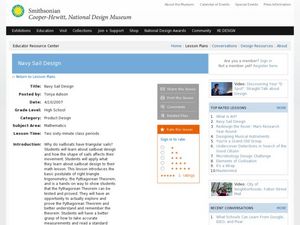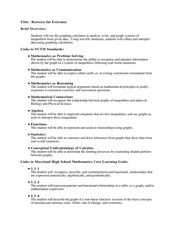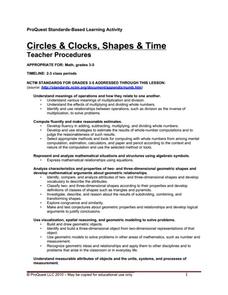Florida Center for Instructional Technology
A Human Number Line: Teacher Notes
Twenty-one pieces of tagboard can lead your class to a greater understanding of integers when you use them to form a human number line. After creating this math tool, two strategies for adding and subtracting will have your...
Arizona Department of Education
Introduction to Integers
Welcome to the backward world of negative numbers. This introductory lesson teaches young mathematicians that negative numbers are simply the opposite of positive numbers as they use number lines to plot and compare...
Curated OER
Today is Monday - Calendar Math
Students practice memorizing the seven days of the week and keeping them in order. In this calendar lesson, students read aloud the book Today is Monday by Eric Carle, and create their own calendar style book using educational...
Arizona Department of Education
Area and Perimeter of Regular and Irregular Polygons
Extend young mathematicians' understanding of area with a geometry lesson on trapezoids. Building on their prior knowledge of rectangles and triangles, students learn how to calculate the area of trapezoids and other...
Curated OER
Substitution Process in Problem Solving
Students apply the substitution process to solve equations with more than one variable. They explore how to use the process and when it should be used.
Curated OER
Compare and Arrange Whole Numbers Up to 100
Number whizzes investigate integers by arranging them in a specific order. They utilize whole numbers which are given to them and then put them in order up to 100. They also practice using "greater than" or "lesser than" symbols.
Curated OER
Navy Sail Design
High schoolers use the Pythagorean Theorem to explore sailboat design. In this Pythagorean Theorem lesson plan, two sides of a triangular sail are measured, and the theorem is used to calculate the third side. A worksheet, bulletin board...
Curated OER
Putting Your Best Foot Forward
Third graders measure their feet and their parents' feet, record data on computer-generated graphs, and calculate and record mean, median, and mode.
Curated OER
An Introduction to Public Key Cryptography
Students secure information online using cryptography. In this algebra lesson, students use RSA technology to encrypt information on the internet. They use modular reduction of natural numbers to understand prime number theory.
Curated OER
Between The Extremes
Students analyze graphs for specific properties. In this algebra lesson, students solve equations and graph using the TI calculator. They find the different changes that occur in each graph,including maximum and minimum.
Curated OER
Brainstorming and Number Patterns
Ninth graders discover what it means to "brainstorm." They explore a given simple number pattern and then, working in groups, brainstorm more complicated number patterns. They display them around the room and then solve the number...
Curated OER
Circles and Clocks, Shapes and Time
Students work in groups to research clocks and practice telling time. In this telling time instructional activity, students use the computer program ProQuest to study circles, including radius and diameter, and practice drawing circles...
Curated OER
How Many Cards Do We Need to Display the Dates of the Month?
Students complete activities to study the concept of place value notation. In this place value lesson, students use cards for the days of the month that only number from 1 to 9. Students find a subtraction pattern to determine the amount...
Curated OER
Writing Directions for Mathematical Activities
Fifth graders reorganize comic strips to have them make sense, complete outline and organize their thoughts into outline form to explain directions,
and use that outline to complete their own directions for geometry activities.













